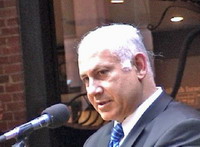Jerusalem must forever remain united under Israeli control
Benjamin Netanyahu, the former prime minister, declared the city must forever remain united under Israeli control.

His comments, at times drowned out by the chants of a Muslim preacher, follow growing signs that Prime Minister Ehud Olmert is ready to share control of Jerusalem under a final peace settlement with the Palestinians.
Netanyahu and other senior members of the hawkish Likud Party on Tuesday climbed the Tower of David, built 2,000 years ago to protect the walls of ancient Jerusalem, and then headed to the Mount of Olives, where Jews believe the dead will be resurrected in the end of days.
"Jerusalem has been the pulsating heart of the Jewish people," Netanyahu said. "Now there are those who come and say, let's divide this heart."
The city, sacred to Jews, Muslims and Christians, is also at the heart of the Israeli-Palestinian conflict - and remains one of the most sensitive sticking points as the two sides seek to reduce their differences ahead of a U.S.-sponsored peace conference.
The Palestinians insist the eastern section of the city, where Arabs are the majority, must be the capital of their hoped-for state - and that a future Palestine have sovereignty over the Al Aqsa Mosque compound, the third holiest site in Islam where Muslims believe the Prophet Muhammad ascended to heaven.
"I think Mr. Netanyahu should focus on peacemaking, rather than trying to undermine" the fledgling peace process, said Palestinian negotiator Saeb Erekat. "They (Israelis) all know at the end of the day that Jerusalem must be the capital of the two states."
Netanyahu warned that Islamic militants will take control of any part of the city evacuated by Israel - as they did in the Gaza Strip after Israel withdrew from that territory in 2005.
"The first thing that will happen is that when we leave, Hamas comes in," he said.
Netanyahu made his comments while peering out over one of Jerusalem's most emotional landscapes - featuring the Church of the Holy Sepulcher, where Christian tradition holds Jesus was crucified, and the Al Aqsa Mosque compound, which is also Judaism's most sacred site because it's built where the biblical temples once stood.
The view didn't inspire any notions of sharing among the Likud stalwarts, however. Rather, they said it was a reminder that only under Jewish control has the city been open to all religions. Israel captured east Jerusalem, including the walled Old City, in the 1967 Mideast war, along with the West Bank and Gaza.
Netanyahu called the Old City "the most explosive square kilometer in human history" kept calm only by Israel's presence.
"It ain't broke. Don't fix it," he said. "They (Islamic militants) will do here things that we cannot even imagine."
Palestinian and Israeli peace advocates say that Israeli rule in Jerusalem has been far from benign. Successive Israeli governments have moved aggressively to establish Jewish footholds in Arab sections of the city, in addition to ringing east Jerusalem with Jewish settlements that have largely cut it off from the West Bank.
When Netanyahu was prime minister in 1996, his administration opened a new exit to a tunnel near the Al Aqsa compound, touching off rioting that killed 58 Palestinians, 15 Israelis and three Egyptians.
Tuesday's Likud event was reminiscent of a visit in 2000 by another hawkish Israeli politician - Ariel Sharon - to the Al Aqsa compound, known to Jews as the Temple Mount. That visit, also meant to emphasize Israel's claim of sovereignty, touched off widespread violence.
Recently, however, Olmert has hinted that Jerusalem could be shared under a final peace deal. His vice premier and closest political ally, Haim Ramon, has also raised the idea of a possible division of Jerusalem. Neither considered the issue of sharing the disputed holy site, however.
That idea is anathema to Natan Sharansky, the Soviet dissident-turned-Israeli politician who accompanied Netanyahu on the Mount of Olives on Tuesday.
He recalled uttering the ancient Jewish refrain, "next year in Jerusalem," when he was jailed by the Soviets.
Jerusalem "is the basis of our identity," he said. "You cannot bargain about your identity."
A poll last week by the Israeli daily Yediot Ahronot showed that 63 percent of Israelis oppose any compromise on Jerusalem, and only 21 percent support one. Pollsters questioned 500 people, and the margin of error was 4.5 percentage points.
Polls also show that Netanyahu would win the premiership if elections were held today. Still, a recent Israeli airstrike on a military installation in Syria has helped reduce a precipitous slide in Olmert's popularity. Progress toward peace with the Palestinians could also help Olmert.
Hamas' violent takeover of Gaza has paradoxically led to a renewal of peace contacts between Israelis and the Palestinians' moderate West Bank leadership following seven years of bloodshed and diplomatic paralysis. U.S. President George W. Bush has called an international Mideast peace conference in Annapolis, Maryland, to take place in November or December.
Some of the Likud members at Tuesday's Jerusalem event predicted Olmert's governing coalition will crumble if he concedes too much on Jerusalem at Annapolis.
Subscribe to Pravda.Ru Telegram channel, Facebook, RSS!


